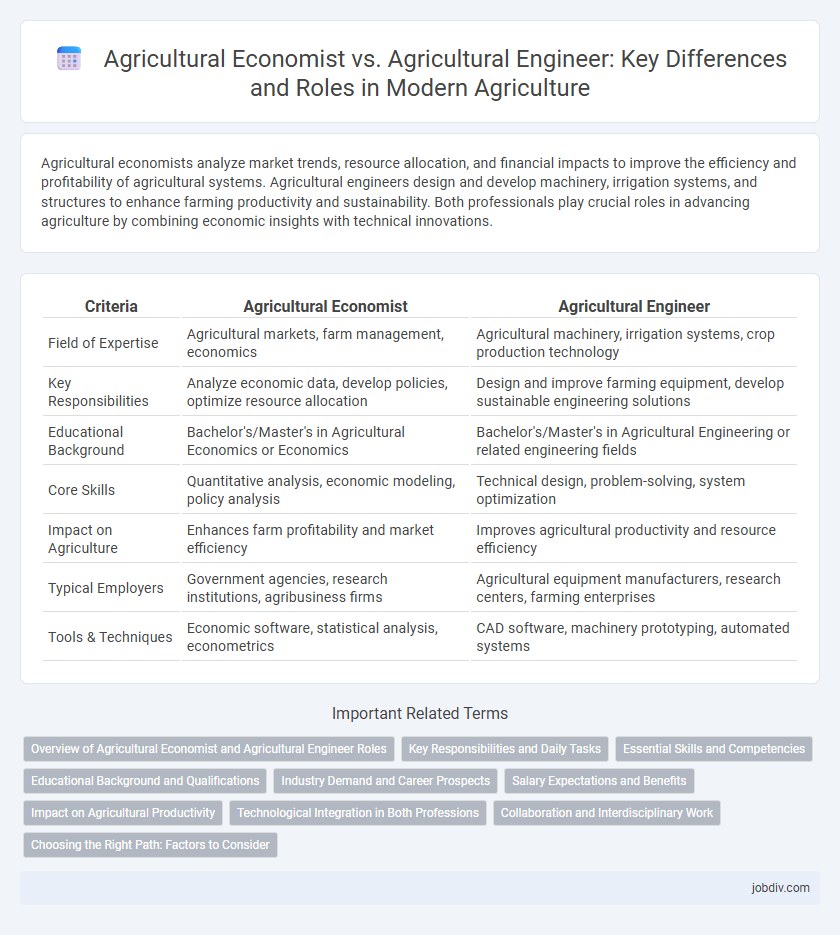Agricultural economists analyze market trends, resource allocation, and financial impacts to improve the efficiency and profitability of agricultural systems. Agricultural engineers design and develop machinery, irrigation systems, and structures to enhance farming productivity and sustainability. Both professionals play crucial roles in advancing agriculture by combining economic insights with technical innovations.
Table of Comparison
| Criteria | Agricultural Economist | Agricultural Engineer |
|---|---|---|
| Field of Expertise | Agricultural markets, farm management, economics | Agricultural machinery, irrigation systems, crop production technology |
| Key Responsibilities | Analyze economic data, develop policies, optimize resource allocation | Design and improve farming equipment, develop sustainable engineering solutions |
| Educational Background | Bachelor's/Master's in Agricultural Economics or Economics | Bachelor's/Master's in Agricultural Engineering or related engineering fields |
| Core Skills | Quantitative analysis, economic modeling, policy analysis | Technical design, problem-solving, system optimization |
| Impact on Agriculture | Enhances farm profitability and market efficiency | Improves agricultural productivity and resource efficiency |
| Typical Employers | Government agencies, research institutions, agribusiness firms | Agricultural equipment manufacturers, research centers, farming enterprises |
| Tools & Techniques | Economic software, statistical analysis, econometrics | CAD software, machinery prototyping, automated systems |
Overview of Agricultural Economist and Agricultural Engineer Roles
Agricultural Economists analyze economic data related to agriculture, focusing on market trends, policy impacts, and resource allocation to improve farm profitability and sustainability. Agricultural Engineers apply engineering principles to develop technologies and machinery that enhance agricultural productivity and environmental management. Both roles contribute to advancing agriculture by integrating economic strategies and technological innovations.
Key Responsibilities and Daily Tasks
Agricultural Economists analyze market trends, evaluate economic data, and develop policies to improve the efficiency and sustainability of agricultural production. Agricultural Engineers design and implement machinery, infrastructure, and technology to enhance farming operations and resource management. While Economists focus on financial modeling and policy impact assessment, Engineers concentrate on technical solutions and system optimization in agriculture.
Essential Skills and Competencies
Agricultural economists excel in data analysis, economic modeling, and policy evaluation to optimize resource allocation and market strategies in agriculture. Agricultural engineers possess expertise in designing irrigation systems, developing machinery, and implementing sustainable farming technologies to improve productivity and environmental impact. Both professions require strong problem-solving abilities, but economists emphasize economic insight while engineers prioritize technical innovation in agricultural systems.
Educational Background and Qualifications
Agricultural Economists typically hold degrees in agricultural economics, economics, or related fields, focusing on economic theory, statistical methods, and policy analysis to address issues in food production and resource management. Agricultural Engineers possess educational backgrounds in agricultural, mechanical, or civil engineering, emphasizing designing and improving farming equipment, irrigation systems, and infrastructure to enhance agricultural productivity. Both professions require strong analytical skills, with Agricultural Economists often pursuing advanced degrees such as a Master's or Ph.D. for research or policy roles, while Agricultural Engineers may obtain professional engineering licenses to validate technical expertise.
Industry Demand and Career Prospects
Agricultural economists specialize in analyzing market trends, policy impacts, and resource management, making them essential in agribusiness, government agencies, and research institutions where data-driven decision-making drives industry growth. Agricultural engineers apply principles of engineering to develop sustainable technologies for farming equipment, irrigation systems, and production facilities, addressing the increasing demand for innovation in precision agriculture and environmental conservation. The career prospects for agricultural economists are strong in sectors focused on economic analysis and policy development, while agricultural engineers see robust opportunities in technology development, equipment manufacturing, and environmental engineering within the rapidly evolving agriculture industry.
Salary Expectations and Benefits
Agricultural economists typically earn an average annual salary ranging from $60,000 to $95,000, with benefits including performance bonuses and opportunities for government or university-sponsored pensions. Agricultural engineers command salaries between $70,000 and $110,000, often supplemented by health insurance plans, retirement packages, and industry-specific allowances. Salary expectations for both roles vary based on experience, location, and sector, with engineers generally receiving higher compensation due to technical expertise requirements.
Impact on Agricultural Productivity
Agricultural economists analyze market trends, resource allocation, and policy impacts to optimize farm management and enhance agricultural productivity through informed economic decision-making. Agricultural engineers design and develop machinery, irrigation systems, and soil management technologies that directly increase crop yields and operational efficiency on farms. Together, these professionals drive productivity improvements by combining economic strategies with innovative engineering solutions.
Technological Integration in Both Professions
Agricultural economists analyze market trends and economic impacts to optimize agricultural productivity, utilizing data analytics software and economic modeling tools for decision-making. Agricultural engineers focus on designing and improving farming equipment, irrigation systems, and machinery by integrating advanced technologies such as automation, sensors, and precision agriculture tools. Both professions leverage technological integration to enhance efficiency, sustainability, and profitability in modern agricultural practices.
Collaboration and Interdisciplinary Work
Agricultural economists and agricultural engineers collaborate to enhance farming efficiency by integrating economic analysis with engineering solutions. Agricultural economists analyze market trends and resource allocation, while agricultural engineers design innovative machinery and systems for sustainable agriculture. Their interdisciplinary teamwork drives advancements in food production, cost reduction, and environmental sustainability.
Choosing the Right Path: Factors to Consider
Choosing between an agricultural economist and an agricultural engineer depends on interests in economic policy, market analysis, and resource management versus designing and improving farming equipment, irrigation systems, and sustainable crop production techniques. Career goals, such as influencing agricultural markets or advancing technological innovations in farming, play a crucial role in the decision-making process. Consider educational background preferences, job market demand, and the impact area--economic outcomes versus engineering solutions--in agriculture when selecting the right professional path.
Agricultural Economist vs Agricultural Engineer Infographic

 jobdiv.com
jobdiv.com